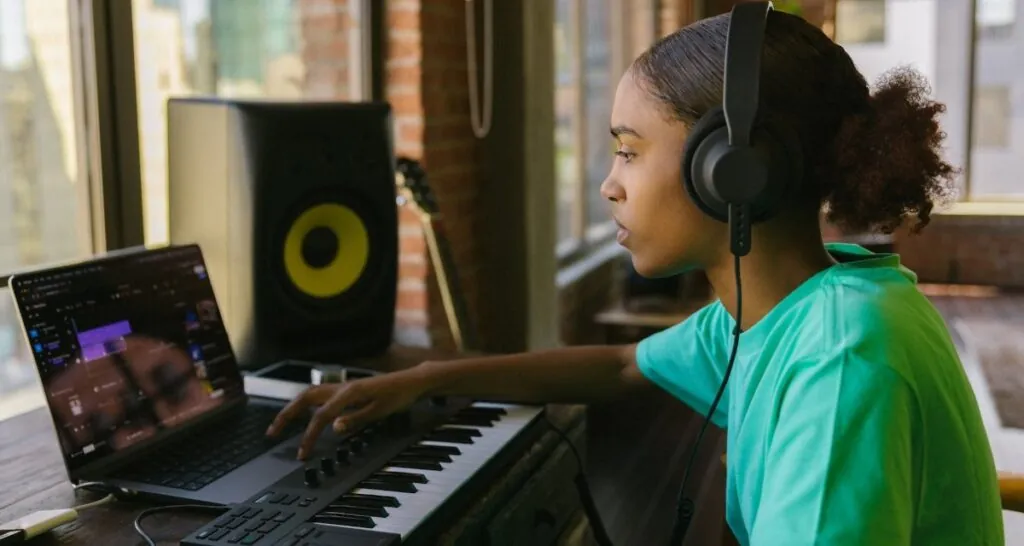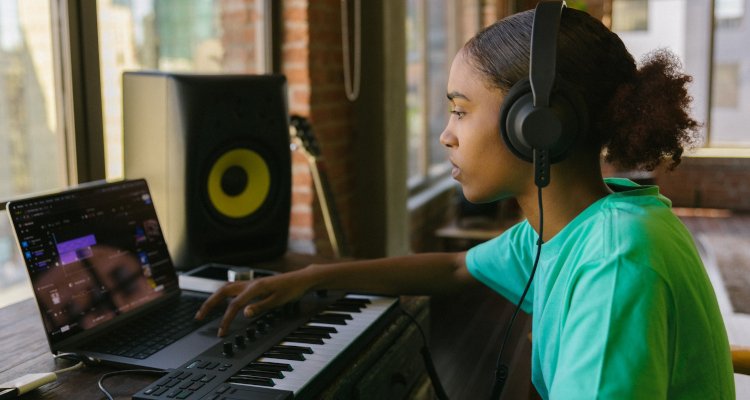Universal Music Group Inks AI-Focused Partnership Deal With SongStarter Developer BandLab


An individual uses BandLab, the parent of which has inked an AI partnership deal with Universal Music Group. Photo Credit: BandLab
Universal Music Group (UMG) has officially partnered with the parent of music-creation platform BandLab on an “expansive, industry-first strategic relationship” involving “ethical” AI.
The Big Three label and Singapore-headquartered BandLab Technologies formally unveiled their AI tie-up this morning. Of course, the deal has arrived as all manner of AI-powered music startups are scoring sizable funding rounds – and as unauthorized soundalike tracks are continuing to make waves.
On the latter front, Universal Music in detailing the BandLab union underscored a “commitment to ethical use of AI and the protection of artist and songwriter rights.” Said commitment resembles that made when the leading music company finalized a pact with relaxation app Endel.
(In another concerning testament to the volume-specific pitfalls of AI music, Endel and Warner Music’s Spinnin’ Records yesterday revealed plans to pump out “50 soundscape album playlists.”)
Emphasizing also BandLab’s support for the Human Artistry Campaign, Universal Music indicated that the deal is expected to involve promoting “responsible AI practices, including pro-creator standards,” besides developing “new and enhanced commercial and marketing opportunities for UMG-signed and BandLab native creators.”
Additionally, UMG relayed that the partnership “is designed to be a beacon of innovation and ethical practice in the industry and heralds a new era where artists are supported and celebrated at every stage of their creative journey.”
Beyond this optimistic line and the above description of the agreement, though, the Universal Production Music parent and BandLab didn’t disclose an abundance of information.
At present, Caldecott Music Group-owned BandLab’s main AI tool appears to be “SongStarter,” which, as its name suggests, allows users to generate described music and then incorporate it into their own commercial releases. And in a statement, UMG EVP and chief digital officer Michael Nash pointed to BandLab’s perceived “dedication to nurturing early-stage artistry.”
“At UMG,” Nash communicated in part, “we constantly seek to empower and support both established and emerging artists. Given BandLab’s passion for music and their dedication to nurturing early-stage artistry at the nexus of ecosystem transformation, they are an excellent partner that is compelling for us on multiple fronts.
“This is more important than ever right now as AI assumes an increasingly prominent place in the evolution of music creation tools,” continued the nearly nine-year UMG exec.
“We look forward to establishing new creative, marketing, and commercial opportunities for our artists and actively engaging with BandLab’s creator community through a highly synergistic structure, collectively protecting today’s and tomorrow’s future superstars through responsible approaches to utilization of AI in the creative process,” he concluded.
Although the long-term commercial effects of enabling non-artists to mass-produce music remain to be seen, the highly discouraging trend is having an immediate impact as well. It was only in May that Spotify pulled a reported seven percent of AI music generator Boomy’s on-platform songs – reportedly in response to fake-stream complaints from Universal Music.
But the setback hasn’t stopped Boomy tracks from making a splash on the streaming service and elsewhere. Boomy’s put out 17.73 million “original songs” thus far, each generated “in seconds,” per the platform’s website. Meanwhile, UMG, notwithstanding dramatic public comments regarding today’s overabundance of low-quality uploads and AI music, has for some time been working to cash in on artificial intelligence.
Link to the source article – https://www.digitalmusicnews.com/2023/10/18/bandlab-universal-music-deal/
Recommended for you
-
Bass Glarry Gjazz Electric 5 String Bass Guitar Full Size Bag Strap Pick Connector Wrench Tool Sunset Color
$103,04 Buy From Amazon -
Behringer NX3000D Power Amplifier with DSP
$479,00 Buy From Amazon -
Babelio Portable Travel Case for Babelio Pocket Mini White Noise Machine, Double Stitch Zipper – Perfect for Traveling (CASE ONLY)
$11,99 Buy From Amazon -
Broadway Gift Co. Banjo Miniature Replica Bright White 1.5 x 3 Resin Stone Tabletop Figurine
$12,99 Buy From Amazon -
Logitech G Yeti GX Dynamic RGB Gaming Microphone, Podcast with LIGHTSYNC, Blue VO!CE, G HUB Control, Supercardioid, USB Plug and Play on PC/Mac – Black
$149,95 Buy From Amazon -
Electronic Drum Set, Marrilley 9 Drum Practice Pad with Headphone Jack, Roll-up Drum Pad Machine Built-in Speaker Drum Pedals Drum Sticks 10 Hours Playtime, Great Holiday Xmas Birthday Gift for Kids
$39,99 Buy From Amazon -
100 NormanC Regal Black King, Drummer or Bugle Horn Player African American 15″ Nutcracker Holiday Decor ~ Choose Your Design (Bugle Horn Player)
$47,00 Buy From Amazon -
Drum Set Eastar 22 inch for Adults, 5 Piece Full Size Drum Kit Junior Beginner with Pedal Cymbals Stands Stool and Sticks, Mirror Black
$365,99 Buy From Amazon













Responses